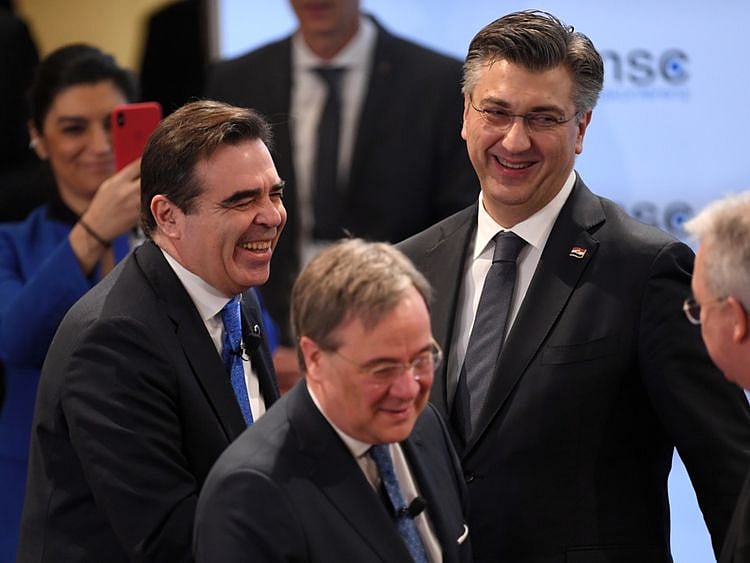Why ‘Westlessness’ is a worry for the world
2020 can be the moment to reset foundations for a renewed West

The Munich Security Conference finished up on Sunday after discussions involving around 500 political and business leaders, including Emmanuel Macron, Mike Pompeo and Mark Zuckerberg. One of the key themes of this year’s event was so-called ‘Westlessness’, reflecting uncertainty about the enduring purpose of the West, despite the fact that it could yet be rejuvenated as a political force.
Key questions about the future of the West pre-date, of course, the Brexit referendum and Donald Trump’s election as US president, yet have been intensified by them. Among the issues that were raised in Munich the last few days included whether the world is becoming less Western, whether the West itself is becoming less Western, and what it means for the world if the West increasingly leaves the international stage to others. This broad-ranging discussion relates to the phenomenon of ‘Westlessness’ which was defined in Munich as a “widespread feeling of uneasiness and restlessness in the face of increasing uncertainty about the enduring purpose of the West [with] many security challenges seem to have become inseparable from what some describe as the decay of the Western project”.
These were very important topics for Munich to focus on amid a growing sense, from many, that a common understanding has been lost of what it even means to be part of the West. One of the key goals of the conference was therefore not just be to explore these issues, but also start to address a key strategic challenge for transatlantic partners of whether the West can come up with a joint strategy for what might be a new era of great power competition.
Rejuvenation of the West
Implausible as it may sound to some, the rejuvenation of the West as the world’s leading political alliance is far from the unlikely project that it might currently appear.
To reset, the first necessary step is for all key parties, including the EU, Canada and Japan, to acknowledge that it may not be possible for the old liberal order to now be brought back lock, stock and barrel. Desirable as that still is for many, it is abundantly clear now that going back to the full panoply of the old rules based international order may not be realistic.
Within the Western bloc, challenges are legion. This includes the issue of climate change where the UN has called for more cooperation which has not materialised amid Trump’s plans to pull out of the Paris agreement later this year .
Moreover, despite the US-China phase one trade deal, wider international economic tensions are high. Aside from US actions, Japan has imposed tariffs on South Korea, and Italy is at loggerheads with France and Brussels over its budget and migration.
Meanwhile, Germany disagrees with its eastern neighbours over the rule of law and energy security. Even Canada is showing some signs of giving up on the post-war liberal order with it having recognised that the WTO dispute-settlement system does not function effectively and is actively pursuing an alternative vehicle.
The start of a new decade in 2020 is a good time to face these facts. And it is the right moment to start exploring what a new Western-led approach to global governance looks like.
A pre-requisite for enabling this goal is concentrating on the big strategic questions facing the West. These are multiple, and won’t be resolved in a single summit, or series of conferences, this year.
For one, the EU and the United Kingdom need to agree on how to manage a disorderly Brexit if reaching a trade deal proves to be impossible. A second is the need for Germany and the United States, with bilateral relations having gone into the deep freeze under Trump and Angela Merkel, to agree that there are a range of security and economic challenges that are better met together.
Thirdly, France and Italy must try to make up their differences. Making the Eurozone safe for the next economic crisis requires deep cooperation between them and Germany too.
Future of the international trade system
But that is only a start. Other issues include the future of the international trade system which is creaking under the strain of recent sanctions imposed across the globe.
Yet, one should not try to do too much in the current context. Over-promising and delivering too little is not the right way to rejuvenate the Western alliance.
If realism prevails and this becomes a multi-year dialogue, forums such as Nato and the G7, imperfect as they remain, can potentially step up to the plate. Nato, for instance, has much continuing relevance with a membership of countries with a collective population of around 1 billion. It remains one of the world’s most successful ever military organisations, helping underpin the longest period of sustained peace in the West’s modern history.
Sceptics will say that nothing big will change, in a positive direction at least, as long as Trump is US president. Problematic as many of the Trump’s policy positions are, the West is not only a community of values, it is also a community of interests.
When values clash, we must concentrate on interests. And at this latest moment of geopolitical and economic uncertainty, 2020 can be the moment to start resetting the foundations for a renewed West.
— Andrew Hammond is an Associate at LSE IDEAS at the London School of Economics.
Network Links
GN StoreDownload our app
© Al Nisr Publishing LLC 2026. All rights reserved.